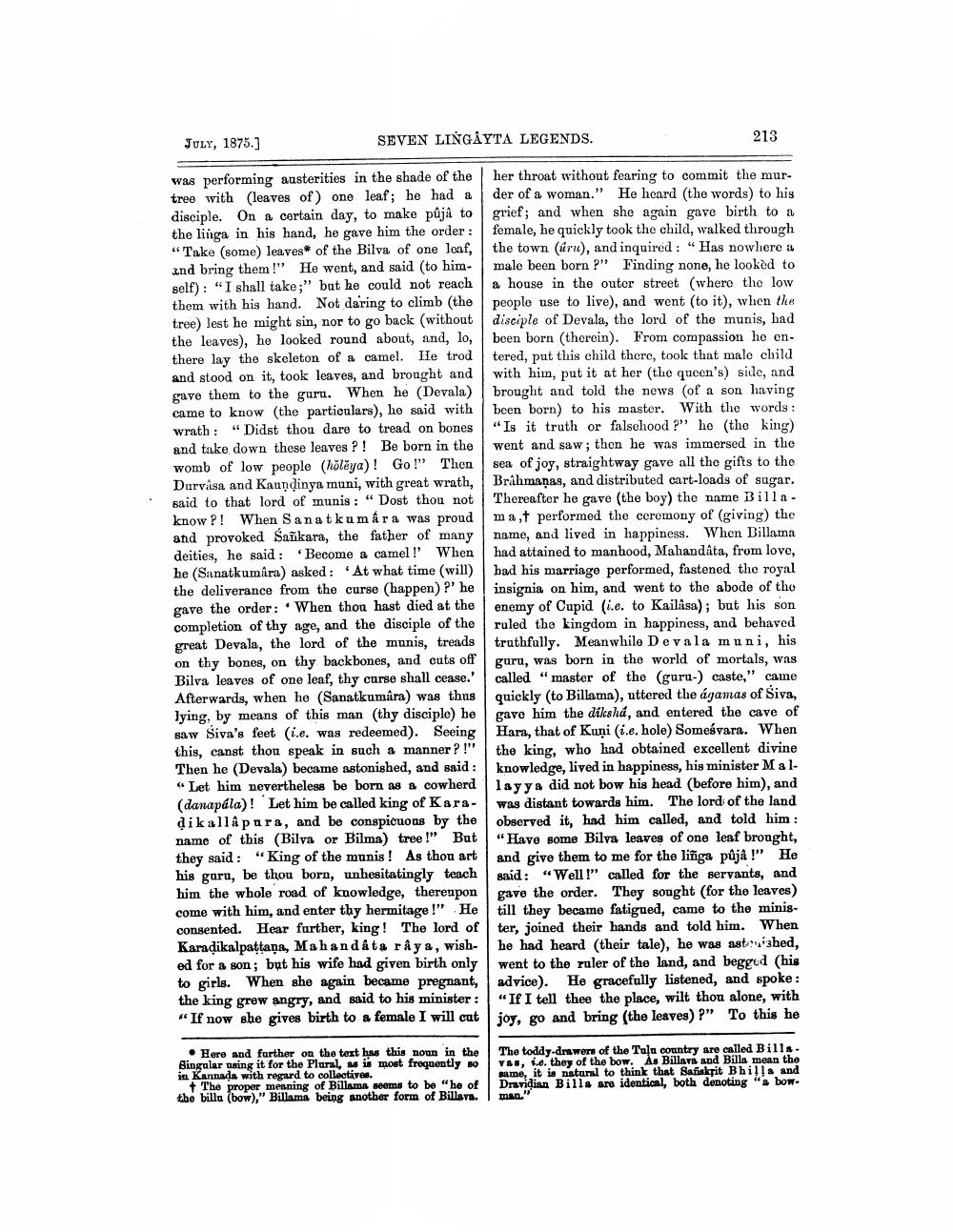________________
SEVEN LINGAYTA LEGENDS.
JULY, 1875.]
:
was performing austerities in the shade of the tree with (leaves of) one leaf; he had a disciple. On a certain day, to make pûjâ to the linga in his hand, he gave him the order: "Take (some) leaves of the Bilva of one leaf, and bring them!" He went, and said (to himself): "I shall take;" but he could not reach them with his hand. Not daring to climb (the tree) lest he might sin, nor to go back (without the leaves), he looked round about, and, lo, there lay the skeleton of a camel. He trod and stood on it, took leaves, and brought and gave them to the guru. When he (Devala) came to know (the particulars), he said with wrath "Didst thou dare to tread on bones and take down these leaves?! Be born in the womb of low people (holeya)! Go!" Then Durvása and Kaundinya muni, with great wrath, said to that lord of munis: "Dost thou not know?! When Sanatkumara was proud and provoked Sankara, the father of many deities, he said: 'Become a camel!' When he (Sanatkumara) asked: At what time (will) the deliverance from the curse (happen) ?' he gave the order: When thou hast died at the completion of thy age, and the disciple of the great Devala, the lord of the munis, treads on thy bones, on thy backbones, and cuts off Bilva leaves of one leaf, thy curse shall cease.' Afterwards, when he (Sanatkumâra) was thus lying, by means of this man (thy disciple) he saw Siva's feet (i.e. was redeemed). Seeing this, canst thou speak in such a manner?!" Then he (Devala) became astonished, and said: "Let him nevertheless be born as a cowherd (danapala)! Let him be called king of Karadikallapura, and be conspicuous by the name of this (Bilva or Bilma) tree!" But they said: "King of the munis! As thou art his guru, be thou born, unhesitatingly teach him the whole road of knowledge, thereupon come with him, and enter thy hermitage!" He consented. Hear further, king! The lord of Karadikalpattana, Mahandâta raya, wished for a son; but his wife had given birth only to girls. When she again became pregnant, the king grew angry, and said to his minister: "If now she gives birth to a female I will cut
Here and further on the text has this noun in the Bingular using it for the Plural, as is most frequently so in Kannada with regard to collectives.
The proper meaning of Billama seems to be "he of the billu (bow)," Billama being another form of Billava.
213
her throat without fearing to commit the murder of a woman." He heard (the words) to his grief; and when she again gave birth to a female, he quickly took the child, walked through the town (úru), and inquired: "Has nowhere a male been born?" Finding none, he looked to a house in the outer street (where the low people use to live), and went (to it), when the disciple of Devala, the lord of the munis, had been born (therein). From compassion he entered, put this child there, took that male child with him, put it at her (the queen's) side, and brought and told the news (of a son having been born) to his master. With the words: "Is it truth or falsehood ?" he (the king) went and saw; then he was immersed in the sea of joy, straightway gave all the gifts to the Brahmanas, and distributed cart-loads of sugar. Thereafter he gave (the boy) the name Billama,t performed the ceremony of (giving) the name, and lived in happiness. When Billama had attained to manhood, Mahandâta, from love, had his marriage performed, fastened the royal insignia on him, and went to the abode of the enemy of Cupid (ie. to Kailasa); but his son ruled the kingdom in happiness, and behaved truthfully. Meanwhile Devala muni, his guru, was born in the world of mortals, was called "master of the (guru-) caste," came quickly (to Billama), uttered the ágamas of Śiva, gave him the dikshá, and entered the cave of Hara, that of Kuni (i.e. hole) Someśvara. When the king, who had obtained excellent divine knowledge, lived in happiness, his minister M allayya did not bow his head (before him), and was distant towards him. The lord of the land observed it, had him called, and told him: "Have some Bilva leaves of one leaf brought, and give them to me for the linga půjâ!" He said: "Well!" called for the servants, and gave the order. They sought (for the leaves) till they became fatigued, came to the minister, joined their hands and told him. When he had heard (their tale), he was astonished, went to the ruler of the land, and begged (his advice). He gracefully listened, and spoke: "If I tell thee the place, wilt thou alone, with joy, go and bring (the leaves) ?" To this he
The toddy-drawers of the Talu country are called Billsvas, i.e. they of the bow. As Billava and Billa mean the same, it is natural to think that Sanskrit Bhilla and Dravidian Billa are identical, both denoting "a bow.
man.




